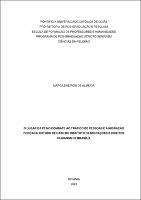| Compartilhamento |


|
Use este identificador para citar ou linkar para este item:
http://tede2.pucgoias.edu.br:8080/handle/tede/4914| Tipo do documento: | Dissertação |
| Título: | O lugar da fé no combate ao tráfico de pessoas e à migração forçada: estudo de caso do Instituto de Migrações e Direitos Humanos de Brasília |
| Título(s) alternativo(s): | The place of faith in the fight against human trafficking and forced migration: a case study of the Institute of Migrations and Human Rights of Brasília |
| Autor: | Almeida, Marcilene Reis de  |
| Primeiro orientador: | Moreira, Alberto da Silva |
| Primeiro membro da banca: | Gomes Filho, Robson |
| Segundo membro da banca: | Quadros, Eduardo Gusmão de |
| Resumo: | A presente dissertação pretende oferecer uma contribuição para os estudos que conjugam os fenômenos migratórios e a religião. A pesquisa, além da consulta à bibliografia especializada, utiliza dados e informações advindos da pesquisa documental e de campo. Analisa também a mudança de postura da Igreja Católica e de seus agentes, no passado e no presente, diante da escravidão, bem como aborda as mudanças ocorridas desde o Concílio Ecumênico Vaticano II (1962-1965) e o advento da Teologia da Libertação, que fizeram a Igreja lançar um olhar diferente aos marginalizados e aos migrantes a nível global. Nesse quadro surge a atuação do Instituto de Migrações e Direitos Humanos (IMDH) em Brasília, uma organização católica que se dedica ao apoio e ao trabalho em prol de pessoas em situação de grande vulnerabilidade, sobretudo migrantes e vítimas do tráfico humano. A pesquisa também visita trabalhos de autores como Gomes, para embasar a questão da escravidão no Brasil; Bauman e Eco foram utilizados para melhor entender a condição dos migrantes e refugiados. Estudos de Milesi e Andrade, Coury, Paula e Rovery, Medeiros e Pinheiro embasaram a pesquisa sobre o trabalho do IMDH na assistência aos migrantes e refugiados e no enfretamento ao tráfico humano. Por fim, Boff e Löwy contribuíram para analisar a Teologia da Libertação e as pastorais sociais da Igreja Católica. A questão central que essa pesquisa busca responder é compreender a motivação religiosa que norteia a atuação dos membros do IMDH. Partimos da hipótese de que a motivação ética e espiritual dos membros dessa organização é um fator decisivo para entender o engajamento da mesma, indo mais além de motivações meramente confessionais. Concluímos finalmente que os membros do IMDH buscam, além de acolher pessoas em vulnerabilidade, desenvolver ações para melhorar ou transformar a estrutura social, para que esta dê mais atenção aos pobres e marginalizados |
| Abstract: | This dissertation intends to offer a contribution to studies that combine migratory phenomena and religion. The research, in addition to consulting the specialized bibliography, uses data and information from documentary and field research. It also analyzes the change in attitude of the Catholic Church and its agents, in the past and in the present, in the face of slavery, as well as addresses the changes that have occurred since the Second Vatican Ecumenical Council (1962-1965) and the advent of Liberation Theology, which made the Church take a different look at the marginalized and migrants globally. In this context, the work of the Institute of Migrations and Human Rights (IMDH) in Brasília, a Catholic organization dedicated to supporting and working on behalf of people in situations of great vulnerability, especially migrants and victims of human trafficking, emerges. The research also visits works by authors such as Gomes, to support the issue of slavery in Brazil; Bauman and Eco were used to better understand the condition of migrants and refugees. Studies by Milesi and Andrade, Coury, Paula and Rovery, Medeiros and Pinheiro supported research on the work of the IMDH in assisting migrants and refugees and in combating human trafficking. Finally, Boff and Löwy contributed to analyze Liberation Theology and the social pastorals of the Catholic Church. The central question that this research seeks to answer is to understand the religious motivation that guides the actions of IMDH members. We start from the hypothesis that the ethical and spiritual motivation of the members of this organization is a decisive factor to understand its commitment, going beyond merely confessional motivations. We finally conclude that IMDH members seek, in addition to welcoming people in vulnerability, to develop actions to improve or transform the social structure, so that it pays more attention to the poor and marginalized |
| Palavras-chave: | Religião Fé Migrantes Refugiados Tráfico humano IMDH Religion Faith Migrants Refugees, Human trafficking |
| Área(s) do CNPq: | Ciências Humanas Teologia |
| Idioma: | por |
| País: | Brasil |
| Instituição: | Pontifícia Universidade Católica de Goiás |
| Sigla da instituição: | PUC Goiás |
| Departamento: | Escola de Formação de Professores e Humanidades |
| Programa: | Programa de Pós-Graduação STRICTO SENSU em Ciências da Religião |
| Citação: | ALMEIDA, Marcilene Reis de. O lugar da fé no combate ao tráfico de pessoas e à migração forçada: estudo de caso do Instituto de Migrações e Direitos Humanos de Brasília. 2023. 120 f. Dissertação (Mestrado em Ciências da Religião) -- Escola de Formação de Professores e Humanidades, Pontifícia Universidade Católica de Goiás, Goiânia, 2023. |
| Tipo de acesso: | Acesso Aberto |
| URI: | http://tede2.pucgoias.edu.br:8080/handle/tede/4914 |
| Data de defesa: | 31-Mar-2023 |
| Aparece nas coleções: | Mestrado em Ciências da Religião |
Arquivos associados a este item:
| Arquivo | Descrição | Tamanho | Formato | |
|---|---|---|---|---|
| Marcilene Reis de Almeida.pdf | 3,39 MB | Adobe PDF |  Baixar/Abrir Pré-Visualizar |
Os itens no repositório estão protegidos por copyright, com todos os direitos reservados, salvo quando é indicado o contrário.




